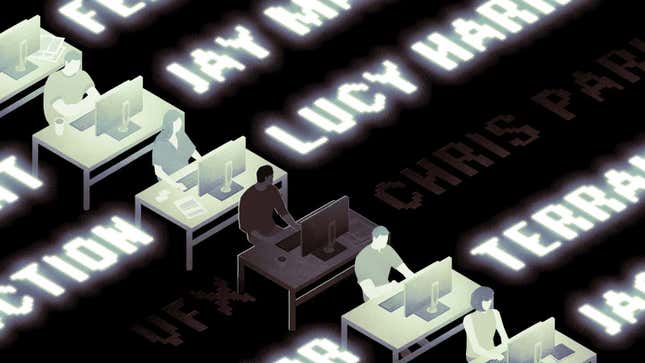
Deathloop is out, and by all accounts it’s pretty good! It’s a shame, then, that it’s also the reason we’re revisiting the topic of, “Video games people being weirdly shitty about who makes it into the credits and who doesn’t.”
A number of developers who worked on the game (who I won’t list here for privacy reasons) have revealed this morning that they’re either not in the credits at all, or have been lumped into a “special thanks” category with no mention made of their specific role in Deathloop’s creation.
As we’ve discussed here previously, the way video game studios arrange their credits can at times be mysterious, and at other times downright petty. Forest Lassman’s wonderful piece on game credits from last year spells this out:
After looking through the credits of hundreds of games, I’ve found a lawless and unstructured world where nothing makes sense. Rules change from game to game for barely any identifiable reason. Discrepancies in game credits range from minor style issues all the way up to deleted names. Credits are a weird, often harsh world, and there’s been little progress in improving them.
What does that look like in action? How about when, “over a thousand people who worked on Red Dead Redemption 2 didn’t make the official credits.”
Many studios have policies in place to only credit developers who were still employed by the studio when the game releases. Over a thousand people who worked on Red Dead Redemption 2 didn’t make the official credits because of this kind of policy. Rockstar told Kotaku last year that it uses the game’s credits in this way because it wants employees to stick it out and “get to the finish line,” essentially punishing those who leave the studio’s culture of crunch. The only confirmation we have that these people worked on the game is a page on Rockstar’s website with no details what they actually did. Even this vague acknowledgement is better than the policies of many studios, which give no official credit to some developers in any way.
And now we have it again with Deathloop. This sucks! Imagine surveying the breadth of effort that went into making a video game and deciding to choose whose hard work to honour and whose to ignore. Predictably, those left out are usually contractors, testers, outsourced studios and former employees no longer with the company at the time a game ships.
Credits are vital not just because they’re an acknowledgement of someone’s work on a project, but because in the video game industry they can be useful (though not always necessary) for getting work on your next project. Being able to point to a game’s credits and say, “That’s me,” is a lot easier than listing a game in your CV, having a prospective employer check that game’s credits, and ask, “Uh why isn’t your name here?”
If you’re at a game studio and involved in putting the credits together, please include everyone who made the game, regardless of how much admin that requires. Even if they no longer work there. Even if they’re a tester. Even if they’re a contractor, or work at a studio you hired for some outsourcing. They worked on the game, they deserve the credit. And not giving it to them makes you look like an asshole.
(For examples on how it can be done right, check out the IGDA’s resources on video game credits).